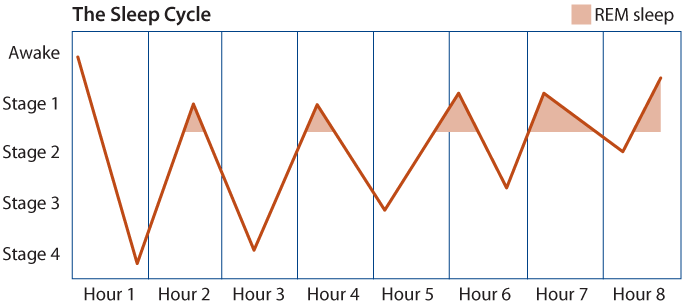The Sleep Cycle
To continue your exploration into the brain and its sleep habits, you need to take a closer look at exactly what your brain does while you're snoozing.
The sleeping brain goes through a cycle that typically lasts about 90 minutes, and repeats that cycle about four times each night. The different stages of the cycle are characterized by dramatically different forms of brain activity. Researchers can spot these stages by hooking a sleeper up to an EEG machine, which records the brain's electrical activity.

Figure 3-5.
Here's a quick rundown of the sleep stages your brain travels through every night:
Stage 1. This is a drowsy semi-conscious stage. Breathing slows and you may experience hypnagogic imagery—visual and auditory hallucinations (for example, flashes of light and sounds of crashing surf) that have no overarching narrative.
Stage 2. This is light sleep. Brain activity slows, but is punctuated by brief spikes of activity called sleep spindles, which last one or two seconds. Half of all the hours you spend asleep are spent in this stage.
Stage 3. This is a transitionary period of ever-deepening sleep.
Stage 4. This is the deepest stage of sleep. Heartbeat and blood pressure have slowed, and the brain shows a slow, steady form of activity known as delta waves. This is also the stage of sleep when sleepwalking and sleeptalking strike. If you're woken up while in stage ...
Get Your Brain: The Missing Manual now with the O’Reilly learning platform.
O’Reilly members experience books, live events, courses curated by job role, and more from O’Reilly and nearly 200 top publishers.

